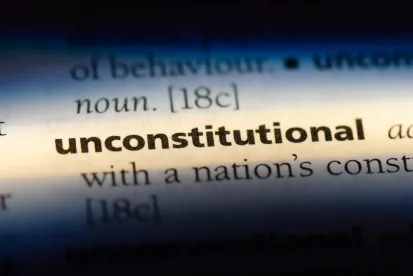On March 1, 2024, Judge Liles C. Burke of the U.S. District Court for the Northern District of Alabama ruled that the Corporate Transparency Act (the “CTA”) is unconstitutional[1], leaving its future uncertain. The CTA requires reporting companies to report to FinCEN information about their beneficial owners and company applicants and is intended to help prevent and combat money laundering, terrorist financing, tax fraud and other illicit activity. The ruling enjoined U.S. Department of the Treasury, FinCEN and any other federal agency from enforcing the CTA against the plaintiffs but introduces uncertainty as to the applicability to other reporting companies.
Plaintiffs Isaac Winkles, who owns a number of small businesses in Alabama, and the National Small Business Association filed a lawsuit against the U.S. Department of the Treasury in November 2022 seeking an injunction against the implementation of the CTA as unconstitutional. They argued that the CTA infringes on the rights guaranteed under the First, Fourth and Fifth Amendments to the Constitution. The court ruled in favor of the plaintiffs, finding that the CTA is unconstitutional because it “exceeds the Constitution’s limits on the legislative branch and lacks a sufficient nexus to any enumerated power to be a necessary or proper means of achieving Congress’ policy goals”. The court stated that its conclusion makes it unnecessary to address whether the CTA violates the plaintiffs’ First, Fourth and Fifth Amendment rights, leaving those questions unanswered.
The injunction granted by the court is limited to the plaintiffs. On March 4, 2024, FinCEN released a statement indicating that FinCEN would comply with the court’s order “for as long as it remains in effect” and that the government would not currently enforce the CTA against the plaintiffs, including all members of the National Small Business Association (as of March 1, 2024, the date of the injunction)[2].
We expect the Department of Treasury will appeal this decision to the U.S. Court of Appeals for the Eleventh Circuit and request a stay of the enforcement of the injunction. If such stay is granted, the CTA would still be in force as to the plaintiffs. It is not known how the Eleventh Circuit or other federal courts will rule on the constitutionality of the CTA or when such cases might be finally resolved.
As the injunction issued by the District Court in Alabama is only applicable to the named plaintiffs, all other reporting companies are advised to continue to comply with the CTA reporting requirements.[3] The ruling by the District Court also does not impact reporting requirements under similar state laws (such as the New York State LLC Transparency Act). As the CTA is a new kind of regulation, there are expected to be additional changes and developments. Proskauer continues to monitor this litigation and other developments and will provide updates as they occur.
[1] Nat’l Small Bus. United v. Yellen, No. 5:22-cv-01448-LCB (N.D. Ala. 2022).
[2] Under principles of judicial review, generally only the U.S. Supreme Court is able to invalidate acts of Congress. Accordingly, any findings by District Courts as to a law’s constitutionality and any injunctive relief granted by those courts generally are only binding upon the parties to that particular lawsuit.
[3] For more information on the Corporate Transparency Act and the information required to be included in the Beneficial Ownership Report, please see our client alert, Shining a Light on the Corporate Transparency Act: FinCEN’s Rules for Beneficial Ownership Reporting.








 />i
/>i
